Engaging with a Sustainable Future: Australian Cafe Case Study
VerifiedAdded on 2023/01/19
|15
|4434
|43
Report
AI Summary
This report examines the integration of sustainability into the Australian cafe industry, focusing on environmental, social, and economic aspects. It explores the definition and principles of sustainability, highlighting the pressure on the hospitality sector to adopt sustainable practices due to consumer interest, regulatory regimes, and business benefits. The report presents various models and initiatives, including the Sustainable Restaurant Association (SRA) guidelines and the concept of zero waste, detailing methods for energy reduction, waste management, and resource efficiency. It also delves into the social dimension of sustainability, including ethical considerations and community engagement, using case studies like Sarah's Sister's Sustainable Cafe to illustrate successful implementation of sustainable business models and practices, emphasizing the triple bottom line approach and the importance of local sourcing and community involvement.
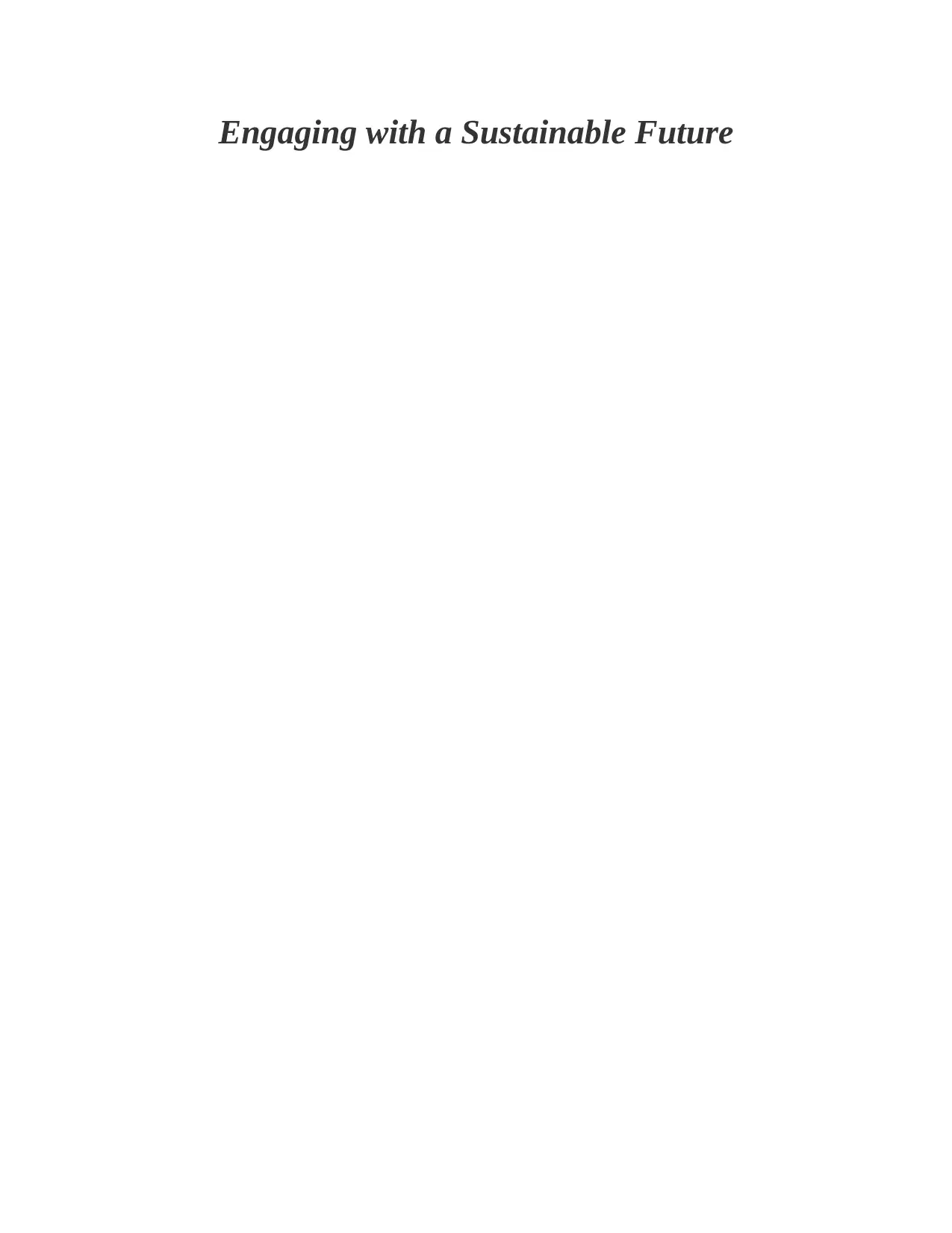
Engaging with a Sustainable Future
Paraphrase This Document
Need a fresh take? Get an instant paraphrase of this document with our AI Paraphraser
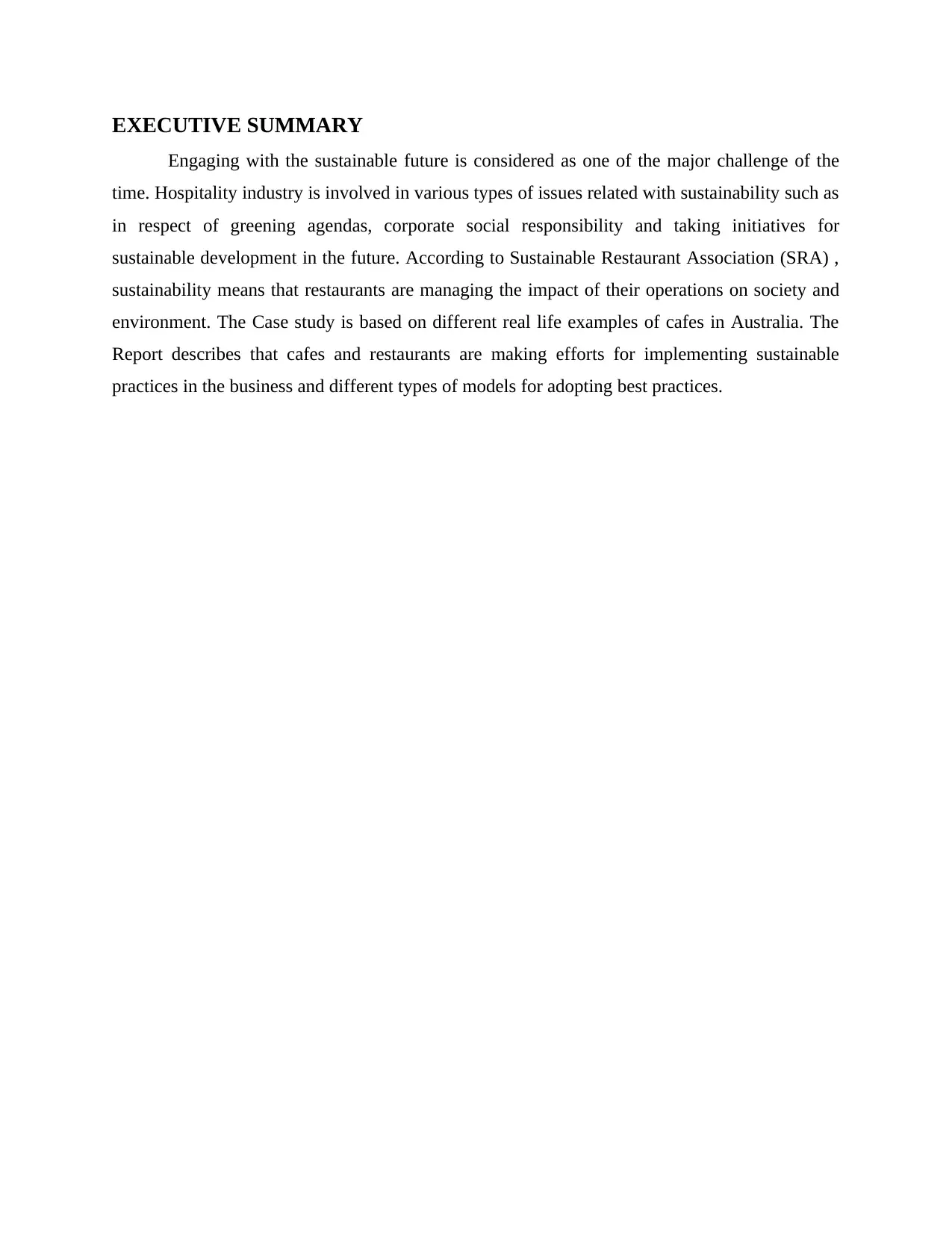
EXECUTIVE SUMMARY
Engaging with the sustainable future is considered as one of the major challenge of the
time. Hospitality industry is involved in various types of issues related with sustainability such as
in respect of greening agendas, corporate social responsibility and taking initiatives for
sustainable development in the future. According to Sustainable Restaurant Association (SRA) ,
sustainability means that restaurants are managing the impact of their operations on society and
environment. The Case study is based on different real life examples of cafes in Australia. The
Report describes that cafes and restaurants are making efforts for implementing sustainable
practices in the business and different types of models for adopting best practices.
Engaging with the sustainable future is considered as one of the major challenge of the
time. Hospitality industry is involved in various types of issues related with sustainability such as
in respect of greening agendas, corporate social responsibility and taking initiatives for
sustainable development in the future. According to Sustainable Restaurant Association (SRA) ,
sustainability means that restaurants are managing the impact of their operations on society and
environment. The Case study is based on different real life examples of cafes in Australia. The
Report describes that cafes and restaurants are making efforts for implementing sustainable
practices in the business and different types of models for adopting best practices.
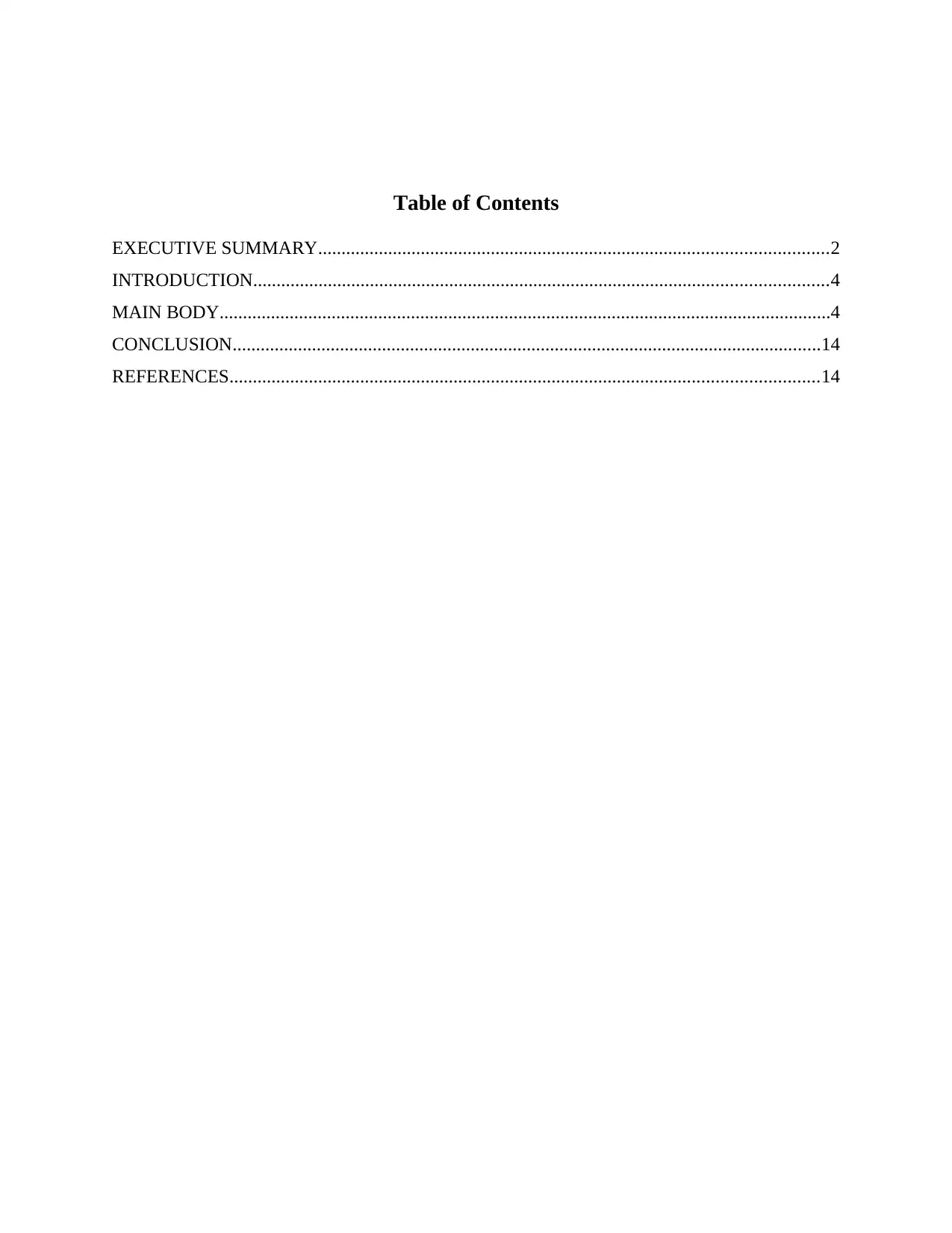
Table of Contents
EXECUTIVE SUMMARY.............................................................................................................2
INTRODUCTION...........................................................................................................................4
MAIN BODY...................................................................................................................................4
CONCLUSION..............................................................................................................................14
REFERENCES..............................................................................................................................14
EXECUTIVE SUMMARY.............................................................................................................2
INTRODUCTION...........................................................................................................................4
MAIN BODY...................................................................................................................................4
CONCLUSION..............................................................................................................................14
REFERENCES..............................................................................................................................14
⊘ This is a preview!⊘
Do you want full access?
Subscribe today to unlock all pages.

Trusted by 1+ million students worldwide
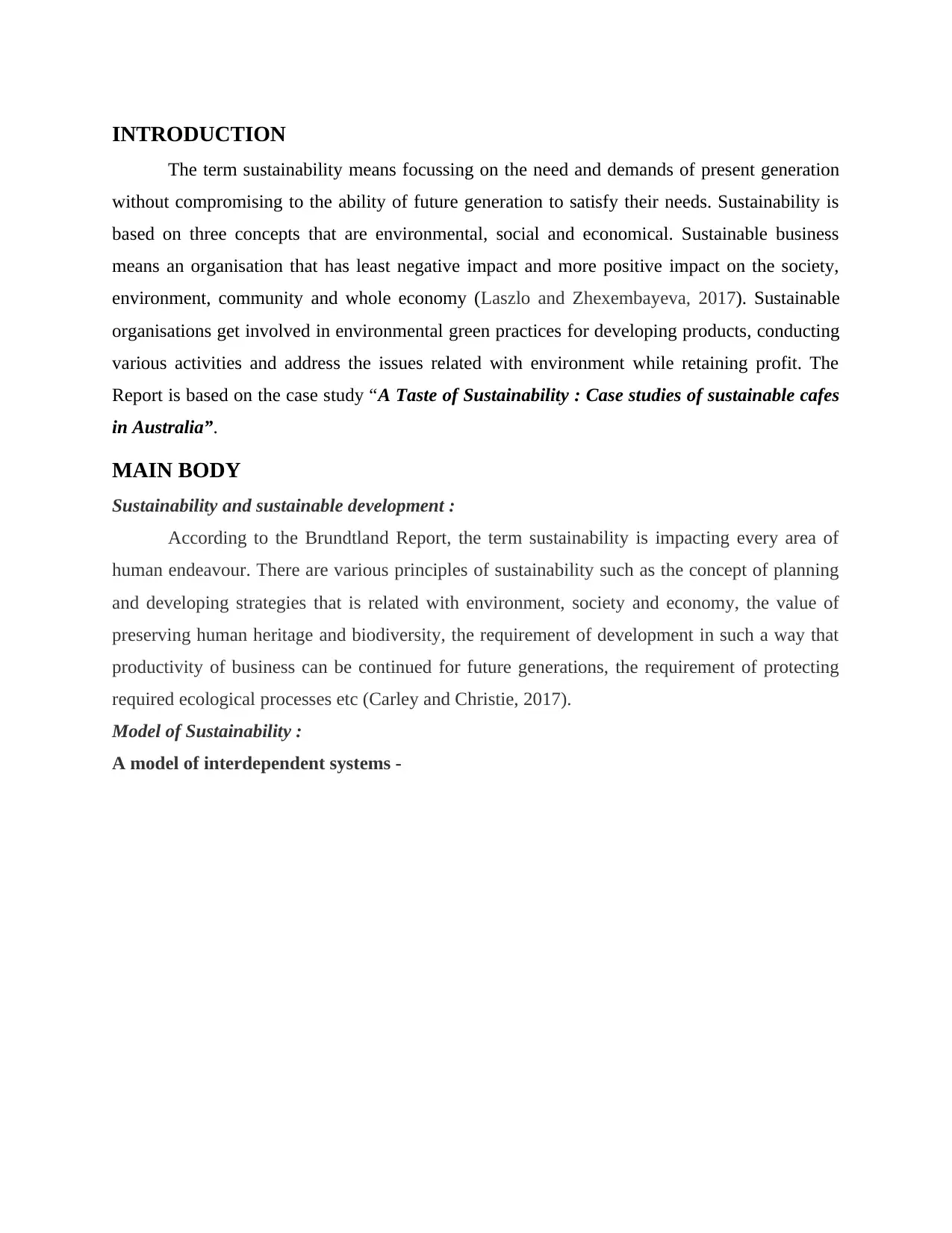
INTRODUCTION
The term sustainability means focussing on the need and demands of present generation
without compromising to the ability of future generation to satisfy their needs. Sustainability is
based on three concepts that are environmental, social and economical. Sustainable business
means an organisation that has least negative impact and more positive impact on the society,
environment, community and whole economy (Laszlo and Zhexembayeva, 2017). Sustainable
organisations get involved in environmental green practices for developing products, conducting
various activities and address the issues related with environment while retaining profit. The
Report is based on the case study “A Taste of Sustainability : Case studies of sustainable cafes
in Australia”.
MAIN BODY
Sustainability and sustainable development :
According to the Brundtland Report, the term sustainability is impacting every area of
human endeavour. There are various principles of sustainability such as the concept of planning
and developing strategies that is related with environment, society and economy, the value of
preserving human heritage and biodiversity, the requirement of development in such a way that
productivity of business can be continued for future generations, the requirement of protecting
required ecological processes etc (Carley and Christie, 2017).
Model of Sustainability :
A model of interdependent systems -
The term sustainability means focussing on the need and demands of present generation
without compromising to the ability of future generation to satisfy their needs. Sustainability is
based on three concepts that are environmental, social and economical. Sustainable business
means an organisation that has least negative impact and more positive impact on the society,
environment, community and whole economy (Laszlo and Zhexembayeva, 2017). Sustainable
organisations get involved in environmental green practices for developing products, conducting
various activities and address the issues related with environment while retaining profit. The
Report is based on the case study “A Taste of Sustainability : Case studies of sustainable cafes
in Australia”.
MAIN BODY
Sustainability and sustainable development :
According to the Brundtland Report, the term sustainability is impacting every area of
human endeavour. There are various principles of sustainability such as the concept of planning
and developing strategies that is related with environment, society and economy, the value of
preserving human heritage and biodiversity, the requirement of development in such a way that
productivity of business can be continued for future generations, the requirement of protecting
required ecological processes etc (Carley and Christie, 2017).
Model of Sustainability :
A model of interdependent systems -
Paraphrase This Document
Need a fresh take? Get an instant paraphrase of this document with our AI Paraphraser
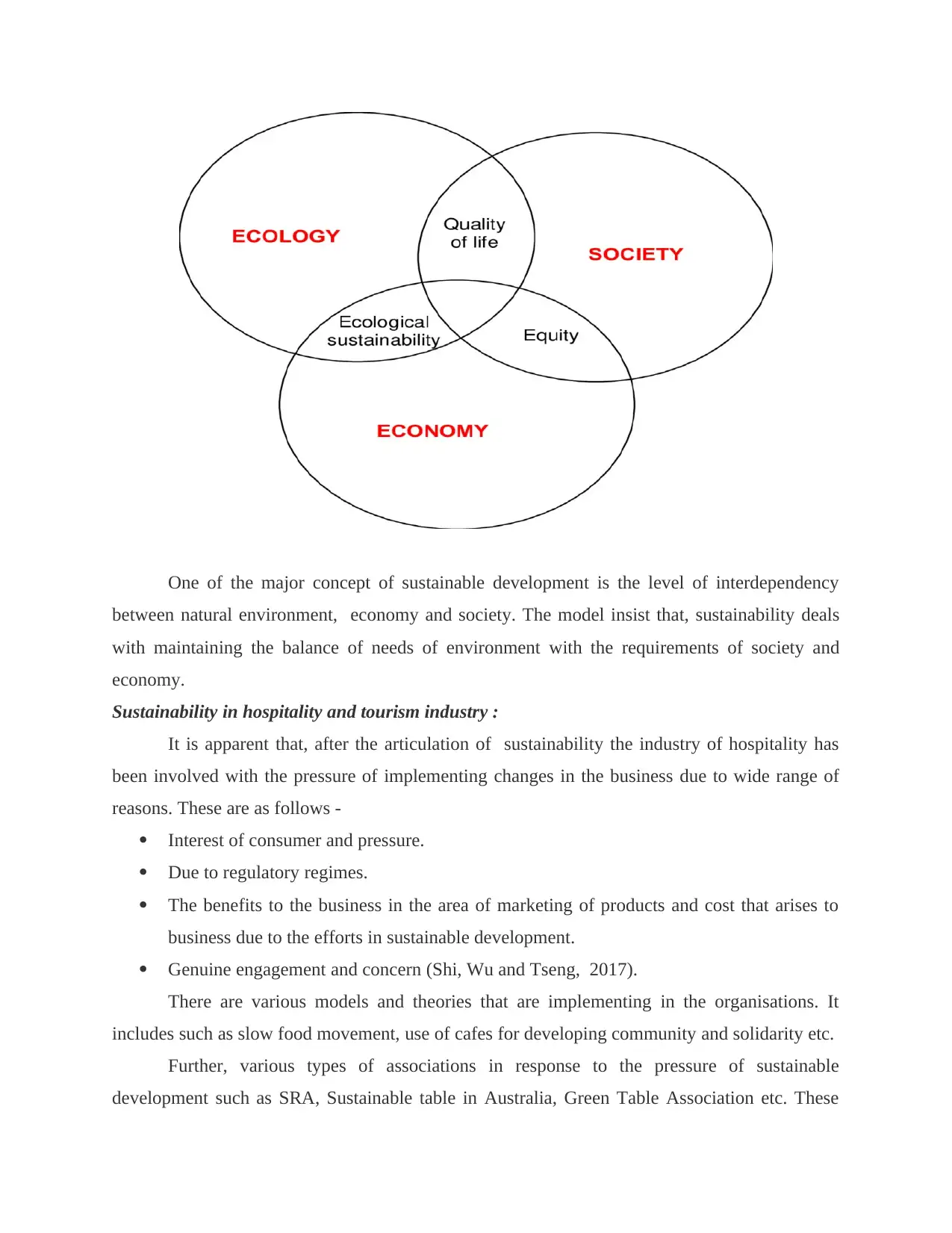
One of the major concept of sustainable development is the level of interdependency
between natural environment, economy and society. The model insist that, sustainability deals
with maintaining the balance of needs of environment with the requirements of society and
economy.
Sustainability in hospitality and tourism industry :
It is apparent that, after the articulation of sustainability the industry of hospitality has
been involved with the pressure of implementing changes in the business due to wide range of
reasons. These are as follows -
Interest of consumer and pressure.
Due to regulatory regimes.
The benefits to the business in the area of marketing of products and cost that arises to
business due to the efforts in sustainable development.
Genuine engagement and concern (Shi, Wu and Tseng, 2017).
There are various models and theories that are implementing in the organisations. It
includes such as slow food movement, use of cafes for developing community and solidarity etc.
Further, various types of associations in response to the pressure of sustainable
development such as SRA, Sustainable table in Australia, Green Table Association etc. These
between natural environment, economy and society. The model insist that, sustainability deals
with maintaining the balance of needs of environment with the requirements of society and
economy.
Sustainability in hospitality and tourism industry :
It is apparent that, after the articulation of sustainability the industry of hospitality has
been involved with the pressure of implementing changes in the business due to wide range of
reasons. These are as follows -
Interest of consumer and pressure.
Due to regulatory regimes.
The benefits to the business in the area of marketing of products and cost that arises to
business due to the efforts in sustainable development.
Genuine engagement and concern (Shi, Wu and Tseng, 2017).
There are various models and theories that are implementing in the organisations. It
includes such as slow food movement, use of cafes for developing community and solidarity etc.
Further, various types of associations in response to the pressure of sustainable
development such as SRA, Sustainable table in Australia, Green Table Association etc. These
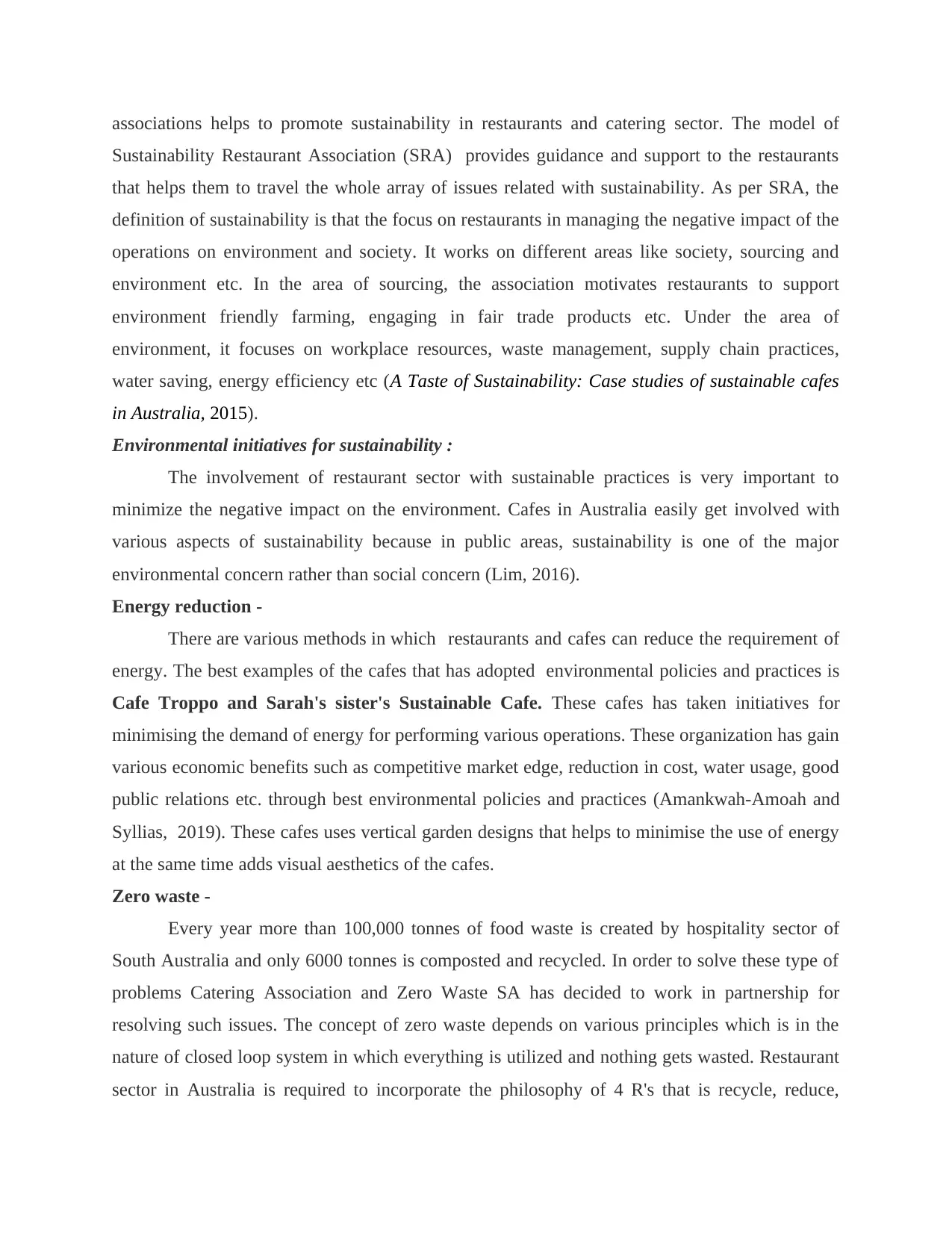
associations helps to promote sustainability in restaurants and catering sector. The model of
Sustainability Restaurant Association (SRA) provides guidance and support to the restaurants
that helps them to travel the whole array of issues related with sustainability. As per SRA, the
definition of sustainability is that the focus on restaurants in managing the negative impact of the
operations on environment and society. It works on different areas like society, sourcing and
environment etc. In the area of sourcing, the association motivates restaurants to support
environment friendly farming, engaging in fair trade products etc. Under the area of
environment, it focuses on workplace resources, waste management, supply chain practices,
water saving, energy efficiency etc (A Taste of Sustainability: Case studies of sustainable cafes
in Australia, 2015).
Environmental initiatives for sustainability :
The involvement of restaurant sector with sustainable practices is very important to
minimize the negative impact on the environment. Cafes in Australia easily get involved with
various aspects of sustainability because in public areas, sustainability is one of the major
environmental concern rather than social concern (Lim, 2016).
Energy reduction -
There are various methods in which restaurants and cafes can reduce the requirement of
energy. The best examples of the cafes that has adopted environmental policies and practices is
Cafe Troppo and Sarah's sister's Sustainable Cafe. These cafes has taken initiatives for
minimising the demand of energy for performing various operations. These organization has gain
various economic benefits such as competitive market edge, reduction in cost, water usage, good
public relations etc. through best environmental policies and practices (Amankwah‐Amoah and
Syllias, 2019). These cafes uses vertical garden designs that helps to minimise the use of energy
at the same time adds visual aesthetics of the cafes.
Zero waste -
Every year more than 100,000 tonnes of food waste is created by hospitality sector of
South Australia and only 6000 tonnes is composted and recycled. In order to solve these type of
problems Catering Association and Zero Waste SA has decided to work in partnership for
resolving such issues. The concept of zero waste depends on various principles which is in the
nature of closed loop system in which everything is utilized and nothing gets wasted. Restaurant
sector in Australia is required to incorporate the philosophy of 4 R's that is recycle, reduce,
Sustainability Restaurant Association (SRA) provides guidance and support to the restaurants
that helps them to travel the whole array of issues related with sustainability. As per SRA, the
definition of sustainability is that the focus on restaurants in managing the negative impact of the
operations on environment and society. It works on different areas like society, sourcing and
environment etc. In the area of sourcing, the association motivates restaurants to support
environment friendly farming, engaging in fair trade products etc. Under the area of
environment, it focuses on workplace resources, waste management, supply chain practices,
water saving, energy efficiency etc (A Taste of Sustainability: Case studies of sustainable cafes
in Australia, 2015).
Environmental initiatives for sustainability :
The involvement of restaurant sector with sustainable practices is very important to
minimize the negative impact on the environment. Cafes in Australia easily get involved with
various aspects of sustainability because in public areas, sustainability is one of the major
environmental concern rather than social concern (Lim, 2016).
Energy reduction -
There are various methods in which restaurants and cafes can reduce the requirement of
energy. The best examples of the cafes that has adopted environmental policies and practices is
Cafe Troppo and Sarah's sister's Sustainable Cafe. These cafes has taken initiatives for
minimising the demand of energy for performing various operations. These organization has gain
various economic benefits such as competitive market edge, reduction in cost, water usage, good
public relations etc. through best environmental policies and practices (Amankwah‐Amoah and
Syllias, 2019). These cafes uses vertical garden designs that helps to minimise the use of energy
at the same time adds visual aesthetics of the cafes.
Zero waste -
Every year more than 100,000 tonnes of food waste is created by hospitality sector of
South Australia and only 6000 tonnes is composted and recycled. In order to solve these type of
problems Catering Association and Zero Waste SA has decided to work in partnership for
resolving such issues. The concept of zero waste depends on various principles which is in the
nature of closed loop system in which everything is utilized and nothing gets wasted. Restaurant
sector in Australia is required to incorporate the philosophy of 4 R's that is recycle, reduce,
⊘ This is a preview!⊘
Do you want full access?
Subscribe today to unlock all pages.

Trusted by 1+ million students worldwide
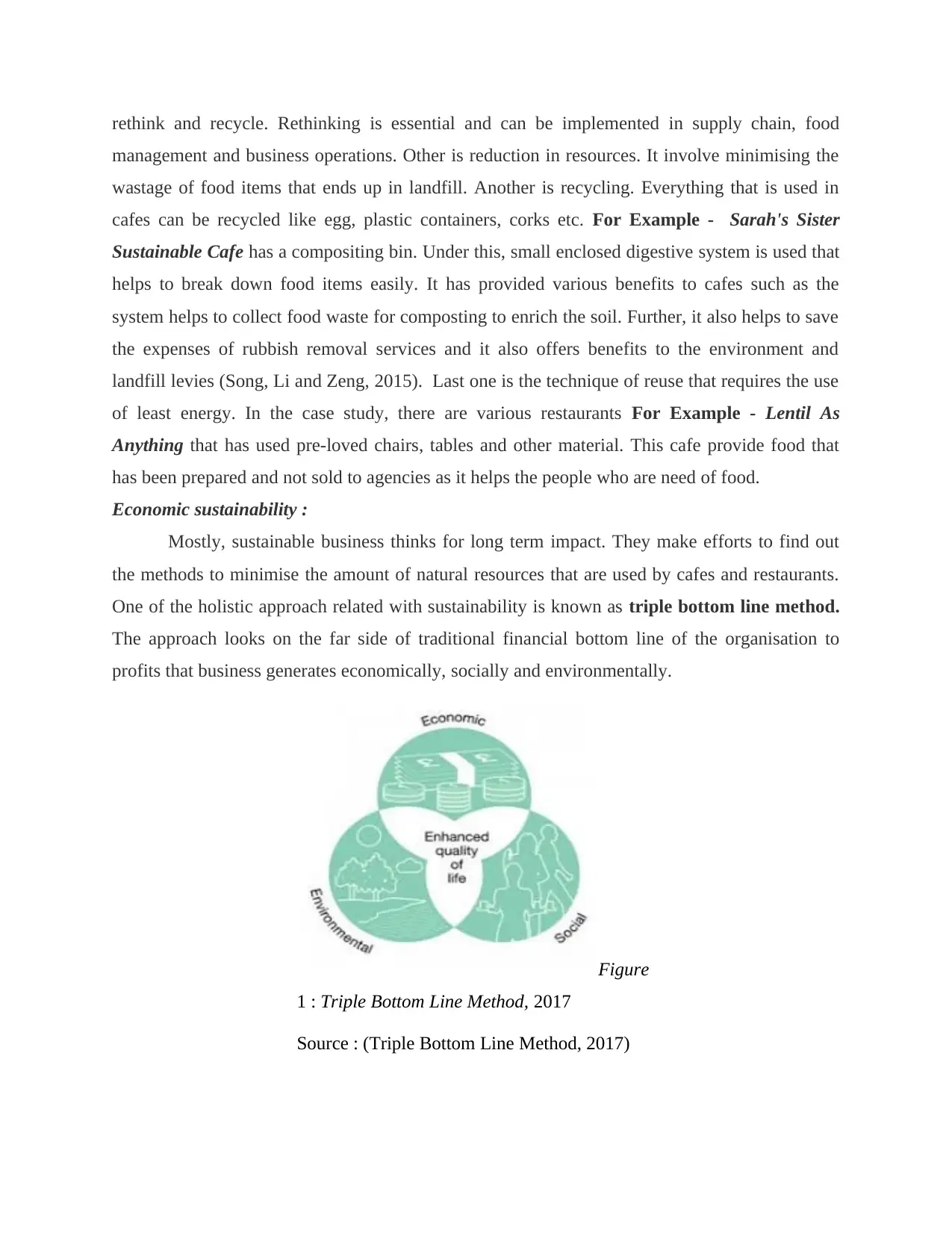
rethink and recycle. Rethinking is essential and can be implemented in supply chain, food
management and business operations. Other is reduction in resources. It involve minimising the
wastage of food items that ends up in landfill. Another is recycling. Everything that is used in
cafes can be recycled like egg, plastic containers, corks etc. For Example - Sarah's Sister
Sustainable Cafe has a compositing bin. Under this, small enclosed digestive system is used that
helps to break down food items easily. It has provided various benefits to cafes such as the
system helps to collect food waste for composting to enrich the soil. Further, it also helps to save
the expenses of rubbish removal services and it also offers benefits to the environment and
landfill levies (Song, Li and Zeng, 2015). Last one is the technique of reuse that requires the use
of least energy. In the case study, there are various restaurants For Example - Lentil As
Anything that has used pre-loved chairs, tables and other material. This cafe provide food that
has been prepared and not sold to agencies as it helps the people who are need of food.
Economic sustainability :
Mostly, sustainable business thinks for long term impact. They make efforts to find out
the methods to minimise the amount of natural resources that are used by cafes and restaurants.
One of the holistic approach related with sustainability is known as triple bottom line method.
The approach looks on the far side of traditional financial bottom line of the organisation to
profits that business generates economically, socially and environmentally.
Figure
1 : Triple Bottom Line Method, 2017
Source : (Triple Bottom Line Method, 2017)
management and business operations. Other is reduction in resources. It involve minimising the
wastage of food items that ends up in landfill. Another is recycling. Everything that is used in
cafes can be recycled like egg, plastic containers, corks etc. For Example - Sarah's Sister
Sustainable Cafe has a compositing bin. Under this, small enclosed digestive system is used that
helps to break down food items easily. It has provided various benefits to cafes such as the
system helps to collect food waste for composting to enrich the soil. Further, it also helps to save
the expenses of rubbish removal services and it also offers benefits to the environment and
landfill levies (Song, Li and Zeng, 2015). Last one is the technique of reuse that requires the use
of least energy. In the case study, there are various restaurants For Example - Lentil As
Anything that has used pre-loved chairs, tables and other material. This cafe provide food that
has been prepared and not sold to agencies as it helps the people who are need of food.
Economic sustainability :
Mostly, sustainable business thinks for long term impact. They make efforts to find out
the methods to minimise the amount of natural resources that are used by cafes and restaurants.
One of the holistic approach related with sustainability is known as triple bottom line method.
The approach looks on the far side of traditional financial bottom line of the organisation to
profits that business generates economically, socially and environmentally.
Figure
1 : Triple Bottom Line Method, 2017
Source : (Triple Bottom Line Method, 2017)
Paraphrase This Document
Need a fresh take? Get an instant paraphrase of this document with our AI Paraphraser
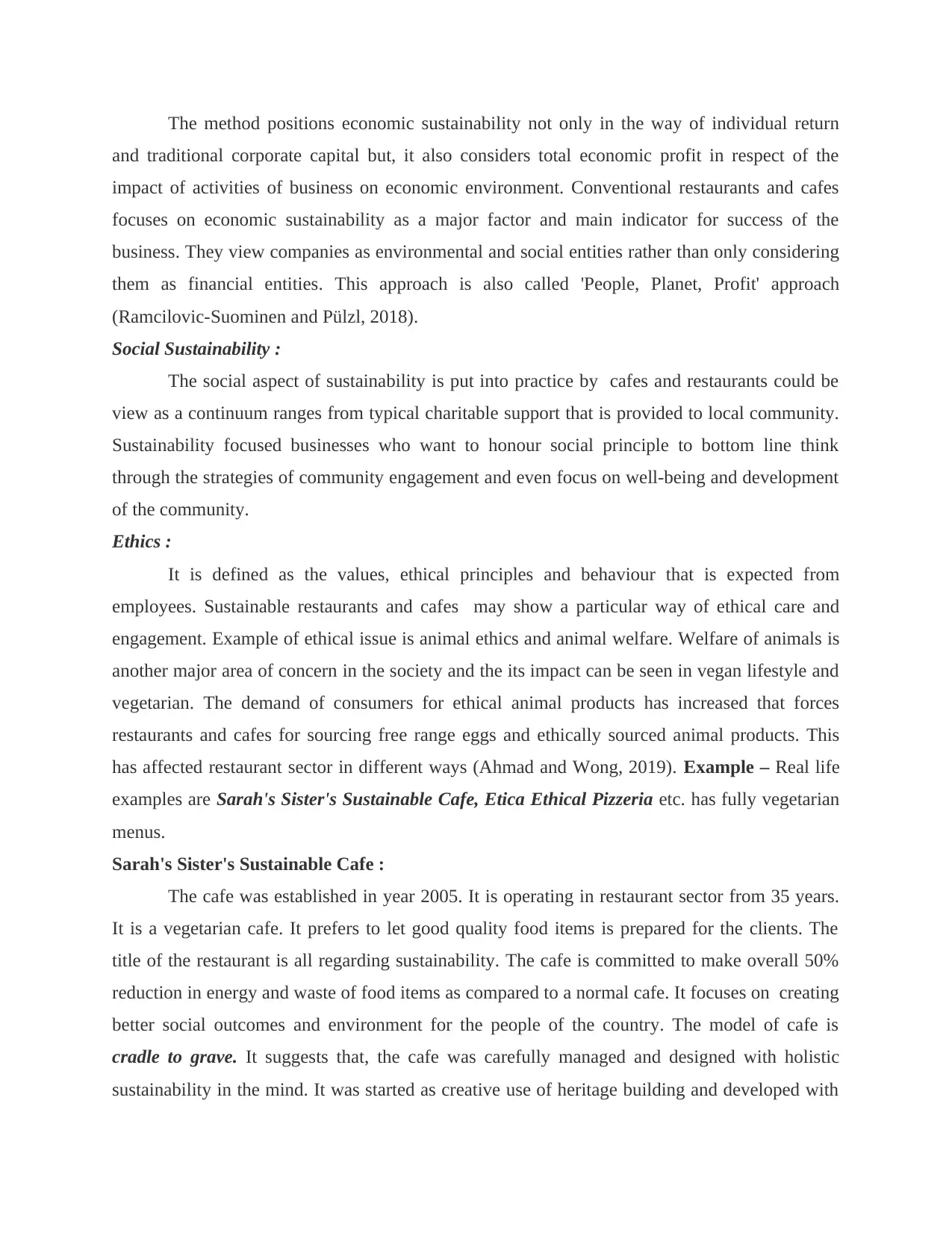
The method positions economic sustainability not only in the way of individual return
and traditional corporate capital but, it also considers total economic profit in respect of the
impact of activities of business on economic environment. Conventional restaurants and cafes
focuses on economic sustainability as a major factor and main indicator for success of the
business. They view companies as environmental and social entities rather than only considering
them as financial entities. This approach is also called 'People, Planet, Profit' approach
(Ramcilovic-Suominen and Pülzl, 2018).
Social Sustainability :
The social aspect of sustainability is put into practice by cafes and restaurants could be
view as a continuum ranges from typical charitable support that is provided to local community.
Sustainability focused businesses who want to honour social principle to bottom line think
through the strategies of community engagement and even focus on well-being and development
of the community.
Ethics :
It is defined as the values, ethical principles and behaviour that is expected from
employees. Sustainable restaurants and cafes may show a particular way of ethical care and
engagement. Example of ethical issue is animal ethics and animal welfare. Welfare of animals is
another major area of concern in the society and the its impact can be seen in vegan lifestyle and
vegetarian. The demand of consumers for ethical animal products has increased that forces
restaurants and cafes for sourcing free range eggs and ethically sourced animal products. This
has affected restaurant sector in different ways (Ahmad and Wong, 2019). Example – Real life
examples are Sarah's Sister's Sustainable Cafe, Etica Ethical Pizzeria etc. has fully vegetarian
menus.
Sarah's Sister's Sustainable Cafe :
The cafe was established in year 2005. It is operating in restaurant sector from 35 years.
It is a vegetarian cafe. It prefers to let good quality food items is prepared for the clients. The
title of the restaurant is all regarding sustainability. The cafe is committed to make overall 50%
reduction in energy and waste of food items as compared to a normal cafe. It focuses on creating
better social outcomes and environment for the people of the country. The model of cafe is
cradle to grave. It suggests that, the cafe was carefully managed and designed with holistic
sustainability in the mind. It was started as creative use of heritage building and developed with
and traditional corporate capital but, it also considers total economic profit in respect of the
impact of activities of business on economic environment. Conventional restaurants and cafes
focuses on economic sustainability as a major factor and main indicator for success of the
business. They view companies as environmental and social entities rather than only considering
them as financial entities. This approach is also called 'People, Planet, Profit' approach
(Ramcilovic-Suominen and Pülzl, 2018).
Social Sustainability :
The social aspect of sustainability is put into practice by cafes and restaurants could be
view as a continuum ranges from typical charitable support that is provided to local community.
Sustainability focused businesses who want to honour social principle to bottom line think
through the strategies of community engagement and even focus on well-being and development
of the community.
Ethics :
It is defined as the values, ethical principles and behaviour that is expected from
employees. Sustainable restaurants and cafes may show a particular way of ethical care and
engagement. Example of ethical issue is animal ethics and animal welfare. Welfare of animals is
another major area of concern in the society and the its impact can be seen in vegan lifestyle and
vegetarian. The demand of consumers for ethical animal products has increased that forces
restaurants and cafes for sourcing free range eggs and ethically sourced animal products. This
has affected restaurant sector in different ways (Ahmad and Wong, 2019). Example – Real life
examples are Sarah's Sister's Sustainable Cafe, Etica Ethical Pizzeria etc. has fully vegetarian
menus.
Sarah's Sister's Sustainable Cafe :
The cafe was established in year 2005. It is operating in restaurant sector from 35 years.
It is a vegetarian cafe. It prefers to let good quality food items is prepared for the clients. The
title of the restaurant is all regarding sustainability. The cafe is committed to make overall 50%
reduction in energy and waste of food items as compared to a normal cafe. It focuses on creating
better social outcomes and environment for the people of the country. The model of cafe is
cradle to grave. It suggests that, the cafe was carefully managed and designed with holistic
sustainability in the mind. It was started as creative use of heritage building and developed with
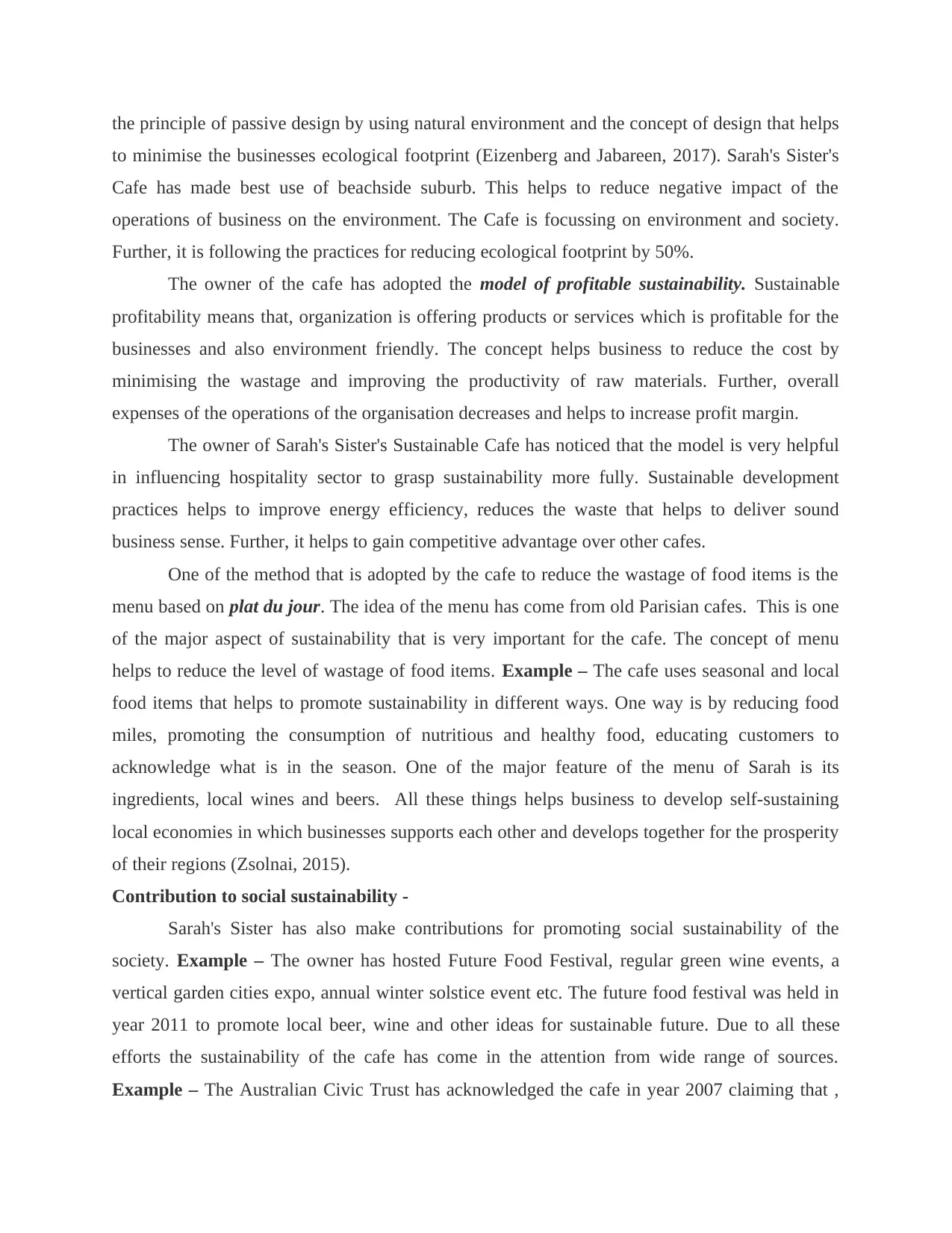
the principle of passive design by using natural environment and the concept of design that helps
to minimise the businesses ecological footprint (Eizenberg and Jabareen, 2017). Sarah's Sister's
Cafe has made best use of beachside suburb. This helps to reduce negative impact of the
operations of business on the environment. The Cafe is focussing on environment and society.
Further, it is following the practices for reducing ecological footprint by 50%.
The owner of the cafe has adopted the model of profitable sustainability. Sustainable
profitability means that, organization is offering products or services which is profitable for the
businesses and also environment friendly. The concept helps business to reduce the cost by
minimising the wastage and improving the productivity of raw materials. Further, overall
expenses of the operations of the organisation decreases and helps to increase profit margin.
The owner of Sarah's Sister's Sustainable Cafe has noticed that the model is very helpful
in influencing hospitality sector to grasp sustainability more fully. Sustainable development
practices helps to improve energy efficiency, reduces the waste that helps to deliver sound
business sense. Further, it helps to gain competitive advantage over other cafes.
One of the method that is adopted by the cafe to reduce the wastage of food items is the
menu based on plat du jour. The idea of the menu has come from old Parisian cafes. This is one
of the major aspect of sustainability that is very important for the cafe. The concept of menu
helps to reduce the level of wastage of food items. Example – The cafe uses seasonal and local
food items that helps to promote sustainability in different ways. One way is by reducing food
miles, promoting the consumption of nutritious and healthy food, educating customers to
acknowledge what is in the season. One of the major feature of the menu of Sarah is its
ingredients, local wines and beers. All these things helps business to develop self-sustaining
local economies in which businesses supports each other and develops together for the prosperity
of their regions (Zsolnai, 2015).
Contribution to social sustainability -
Sarah's Sister has also make contributions for promoting social sustainability of the
society. Example – The owner has hosted Future Food Festival, regular green wine events, a
vertical garden cities expo, annual winter solstice event etc. The future food festival was held in
year 2011 to promote local beer, wine and other ideas for sustainable future. Due to all these
efforts the sustainability of the cafe has come in the attention from wide range of sources.
Example – The Australian Civic Trust has acknowledged the cafe in year 2007 claiming that ,
to minimise the businesses ecological footprint (Eizenberg and Jabareen, 2017). Sarah's Sister's
Cafe has made best use of beachside suburb. This helps to reduce negative impact of the
operations of business on the environment. The Cafe is focussing on environment and society.
Further, it is following the practices for reducing ecological footprint by 50%.
The owner of the cafe has adopted the model of profitable sustainability. Sustainable
profitability means that, organization is offering products or services which is profitable for the
businesses and also environment friendly. The concept helps business to reduce the cost by
minimising the wastage and improving the productivity of raw materials. Further, overall
expenses of the operations of the organisation decreases and helps to increase profit margin.
The owner of Sarah's Sister's Sustainable Cafe has noticed that the model is very helpful
in influencing hospitality sector to grasp sustainability more fully. Sustainable development
practices helps to improve energy efficiency, reduces the waste that helps to deliver sound
business sense. Further, it helps to gain competitive advantage over other cafes.
One of the method that is adopted by the cafe to reduce the wastage of food items is the
menu based on plat du jour. The idea of the menu has come from old Parisian cafes. This is one
of the major aspect of sustainability that is very important for the cafe. The concept of menu
helps to reduce the level of wastage of food items. Example – The cafe uses seasonal and local
food items that helps to promote sustainability in different ways. One way is by reducing food
miles, promoting the consumption of nutritious and healthy food, educating customers to
acknowledge what is in the season. One of the major feature of the menu of Sarah is its
ingredients, local wines and beers. All these things helps business to develop self-sustaining
local economies in which businesses supports each other and develops together for the prosperity
of their regions (Zsolnai, 2015).
Contribution to social sustainability -
Sarah's Sister has also make contributions for promoting social sustainability of the
society. Example – The owner has hosted Future Food Festival, regular green wine events, a
vertical garden cities expo, annual winter solstice event etc. The future food festival was held in
year 2011 to promote local beer, wine and other ideas for sustainable future. Due to all these
efforts the sustainability of the cafe has come in the attention from wide range of sources.
Example – The Australian Civic Trust has acknowledged the cafe in year 2007 claiming that ,
⊘ This is a preview!⊘
Do you want full access?
Subscribe today to unlock all pages.

Trusted by 1+ million students worldwide
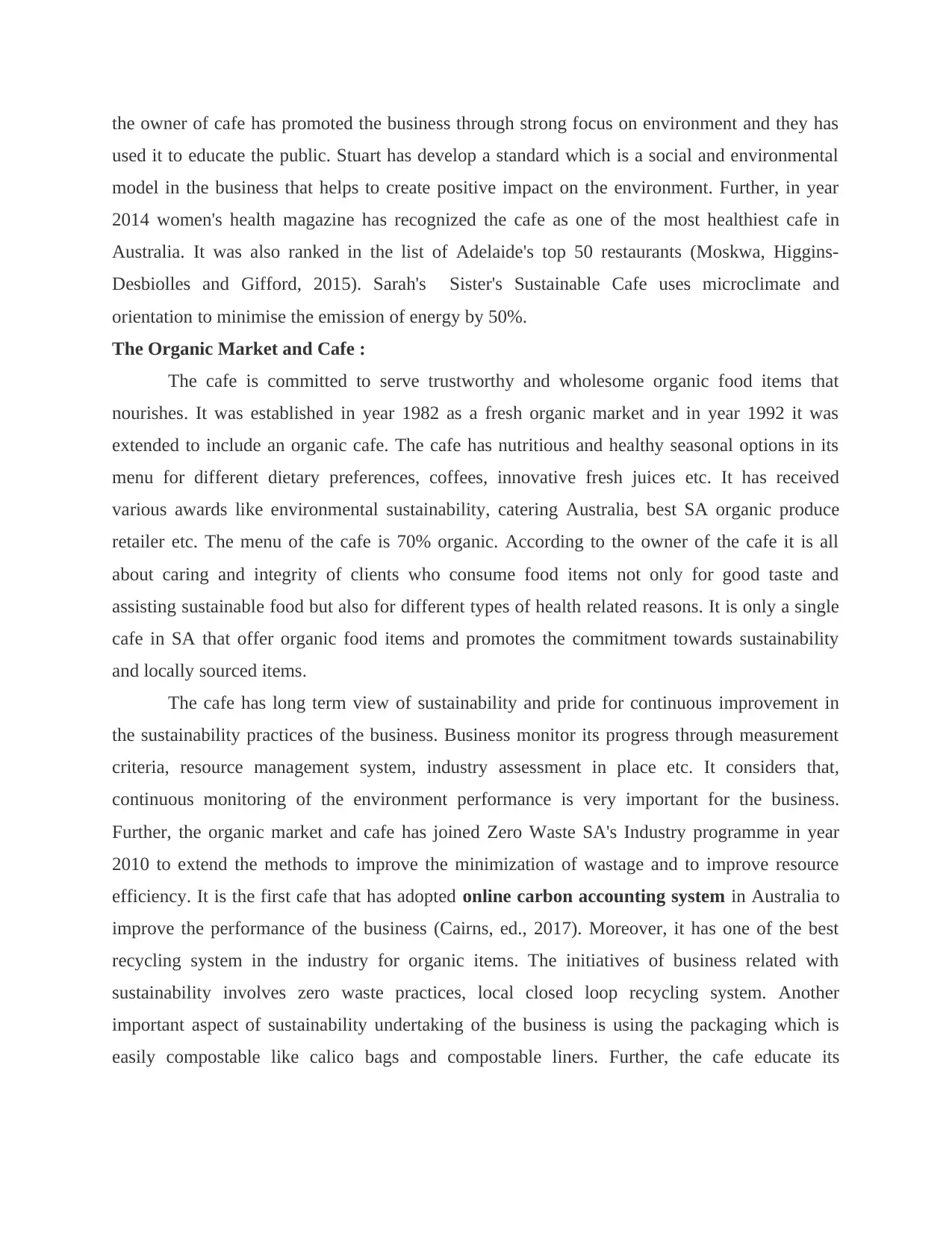
the owner of cafe has promoted the business through strong focus on environment and they has
used it to educate the public. Stuart has develop a standard which is a social and environmental
model in the business that helps to create positive impact on the environment. Further, in year
2014 women's health magazine has recognized the cafe as one of the most healthiest cafe in
Australia. It was also ranked in the list of Adelaide's top 50 restaurants (Moskwa, Higgins-
Desbiolles and Gifford, 2015). Sarah's Sister's Sustainable Cafe uses microclimate and
orientation to minimise the emission of energy by 50%.
The Organic Market and Cafe :
The cafe is committed to serve trustworthy and wholesome organic food items that
nourishes. It was established in year 1982 as a fresh organic market and in year 1992 it was
extended to include an organic cafe. The cafe has nutritious and healthy seasonal options in its
menu for different dietary preferences, coffees, innovative fresh juices etc. It has received
various awards like environmental sustainability, catering Australia, best SA organic produce
retailer etc. The menu of the cafe is 70% organic. According to the owner of the cafe it is all
about caring and integrity of clients who consume food items not only for good taste and
assisting sustainable food but also for different types of health related reasons. It is only a single
cafe in SA that offer organic food items and promotes the commitment towards sustainability
and locally sourced items.
The cafe has long term view of sustainability and pride for continuous improvement in
the sustainability practices of the business. Business monitor its progress through measurement
criteria, resource management system, industry assessment in place etc. It considers that,
continuous monitoring of the environment performance is very important for the business.
Further, the organic market and cafe has joined Zero Waste SA's Industry programme in year
2010 to extend the methods to improve the minimization of wastage and to improve resource
efficiency. It is the first cafe that has adopted online carbon accounting system in Australia to
improve the performance of the business (Cairns, ed., 2017). Moreover, it has one of the best
recycling system in the industry for organic items. The initiatives of business related with
sustainability involves zero waste practices, local closed loop recycling system. Another
important aspect of sustainability undertaking of the business is using the packaging which is
easily compostable like calico bags and compostable liners. Further, the cafe educate its
used it to educate the public. Stuart has develop a standard which is a social and environmental
model in the business that helps to create positive impact on the environment. Further, in year
2014 women's health magazine has recognized the cafe as one of the most healthiest cafe in
Australia. It was also ranked in the list of Adelaide's top 50 restaurants (Moskwa, Higgins-
Desbiolles and Gifford, 2015). Sarah's Sister's Sustainable Cafe uses microclimate and
orientation to minimise the emission of energy by 50%.
The Organic Market and Cafe :
The cafe is committed to serve trustworthy and wholesome organic food items that
nourishes. It was established in year 1982 as a fresh organic market and in year 1992 it was
extended to include an organic cafe. The cafe has nutritious and healthy seasonal options in its
menu for different dietary preferences, coffees, innovative fresh juices etc. It has received
various awards like environmental sustainability, catering Australia, best SA organic produce
retailer etc. The menu of the cafe is 70% organic. According to the owner of the cafe it is all
about caring and integrity of clients who consume food items not only for good taste and
assisting sustainable food but also for different types of health related reasons. It is only a single
cafe in SA that offer organic food items and promotes the commitment towards sustainability
and locally sourced items.
The cafe has long term view of sustainability and pride for continuous improvement in
the sustainability practices of the business. Business monitor its progress through measurement
criteria, resource management system, industry assessment in place etc. It considers that,
continuous monitoring of the environment performance is very important for the business.
Further, the organic market and cafe has joined Zero Waste SA's Industry programme in year
2010 to extend the methods to improve the minimization of wastage and to improve resource
efficiency. It is the first cafe that has adopted online carbon accounting system in Australia to
improve the performance of the business (Cairns, ed., 2017). Moreover, it has one of the best
recycling system in the industry for organic items. The initiatives of business related with
sustainability involves zero waste practices, local closed loop recycling system. Another
important aspect of sustainability undertaking of the business is using the packaging which is
easily compostable like calico bags and compostable liners. Further, the cafe educate its
Paraphrase This Document
Need a fresh take? Get an instant paraphrase of this document with our AI Paraphraser
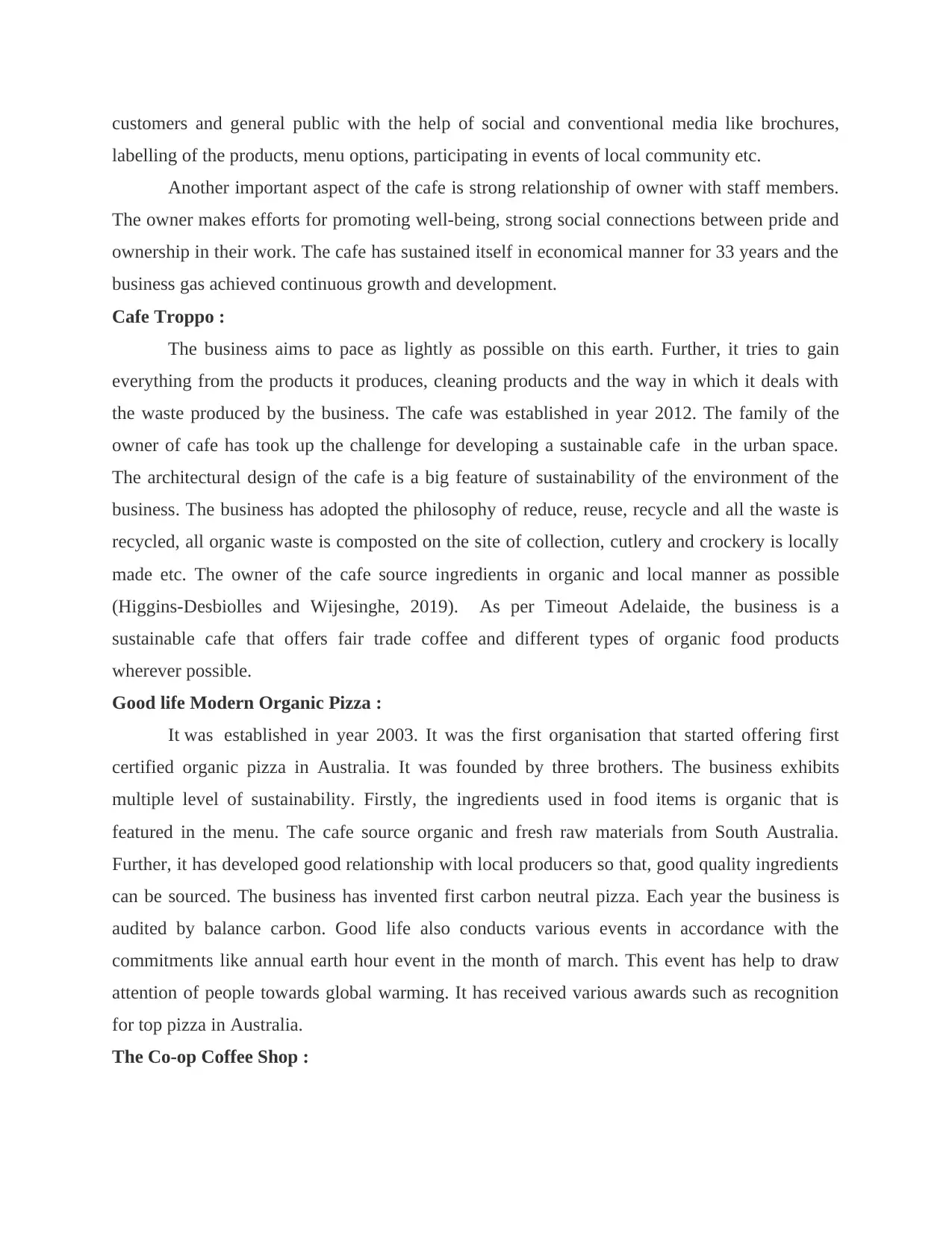
customers and general public with the help of social and conventional media like brochures,
labelling of the products, menu options, participating in events of local community etc.
Another important aspect of the cafe is strong relationship of owner with staff members.
The owner makes efforts for promoting well-being, strong social connections between pride and
ownership in their work. The cafe has sustained itself in economical manner for 33 years and the
business gas achieved continuous growth and development.
Cafe Troppo :
The business aims to pace as lightly as possible on this earth. Further, it tries to gain
everything from the products it produces, cleaning products and the way in which it deals with
the waste produced by the business. The cafe was established in year 2012. The family of the
owner of cafe has took up the challenge for developing a sustainable cafe in the urban space.
The architectural design of the cafe is a big feature of sustainability of the environment of the
business. The business has adopted the philosophy of reduce, reuse, recycle and all the waste is
recycled, all organic waste is composted on the site of collection, cutlery and crockery is locally
made etc. The owner of the cafe source ingredients in organic and local manner as possible
(Higgins-Desbiolles and Wijesinghe, 2019). As per Timeout Adelaide, the business is a
sustainable cafe that offers fair trade coffee and different types of organic food products
wherever possible.
Good life Modern Organic Pizza :
It was established in year 2003. It was the first organisation that started offering first
certified organic pizza in Australia. It was founded by three brothers. The business exhibits
multiple level of sustainability. Firstly, the ingredients used in food items is organic that is
featured in the menu. The cafe source organic and fresh raw materials from South Australia.
Further, it has developed good relationship with local producers so that, good quality ingredients
can be sourced. The business has invented first carbon neutral pizza. Each year the business is
audited by balance carbon. Good life also conducts various events in accordance with the
commitments like annual earth hour event in the month of march. This event has help to draw
attention of people towards global warming. It has received various awards such as recognition
for top pizza in Australia.
The Co-op Coffee Shop :
labelling of the products, menu options, participating in events of local community etc.
Another important aspect of the cafe is strong relationship of owner with staff members.
The owner makes efforts for promoting well-being, strong social connections between pride and
ownership in their work. The cafe has sustained itself in economical manner for 33 years and the
business gas achieved continuous growth and development.
Cafe Troppo :
The business aims to pace as lightly as possible on this earth. Further, it tries to gain
everything from the products it produces, cleaning products and the way in which it deals with
the waste produced by the business. The cafe was established in year 2012. The family of the
owner of cafe has took up the challenge for developing a sustainable cafe in the urban space.
The architectural design of the cafe is a big feature of sustainability of the environment of the
business. The business has adopted the philosophy of reduce, reuse, recycle and all the waste is
recycled, all organic waste is composted on the site of collection, cutlery and crockery is locally
made etc. The owner of the cafe source ingredients in organic and local manner as possible
(Higgins-Desbiolles and Wijesinghe, 2019). As per Timeout Adelaide, the business is a
sustainable cafe that offers fair trade coffee and different types of organic food products
wherever possible.
Good life Modern Organic Pizza :
It was established in year 2003. It was the first organisation that started offering first
certified organic pizza in Australia. It was founded by three brothers. The business exhibits
multiple level of sustainability. Firstly, the ingredients used in food items is organic that is
featured in the menu. The cafe source organic and fresh raw materials from South Australia.
Further, it has developed good relationship with local producers so that, good quality ingredients
can be sourced. The business has invented first carbon neutral pizza. Each year the business is
audited by balance carbon. Good life also conducts various events in accordance with the
commitments like annual earth hour event in the month of march. This event has help to draw
attention of people towards global warming. It has received various awards such as recognition
for top pizza in Australia.
The Co-op Coffee Shop :
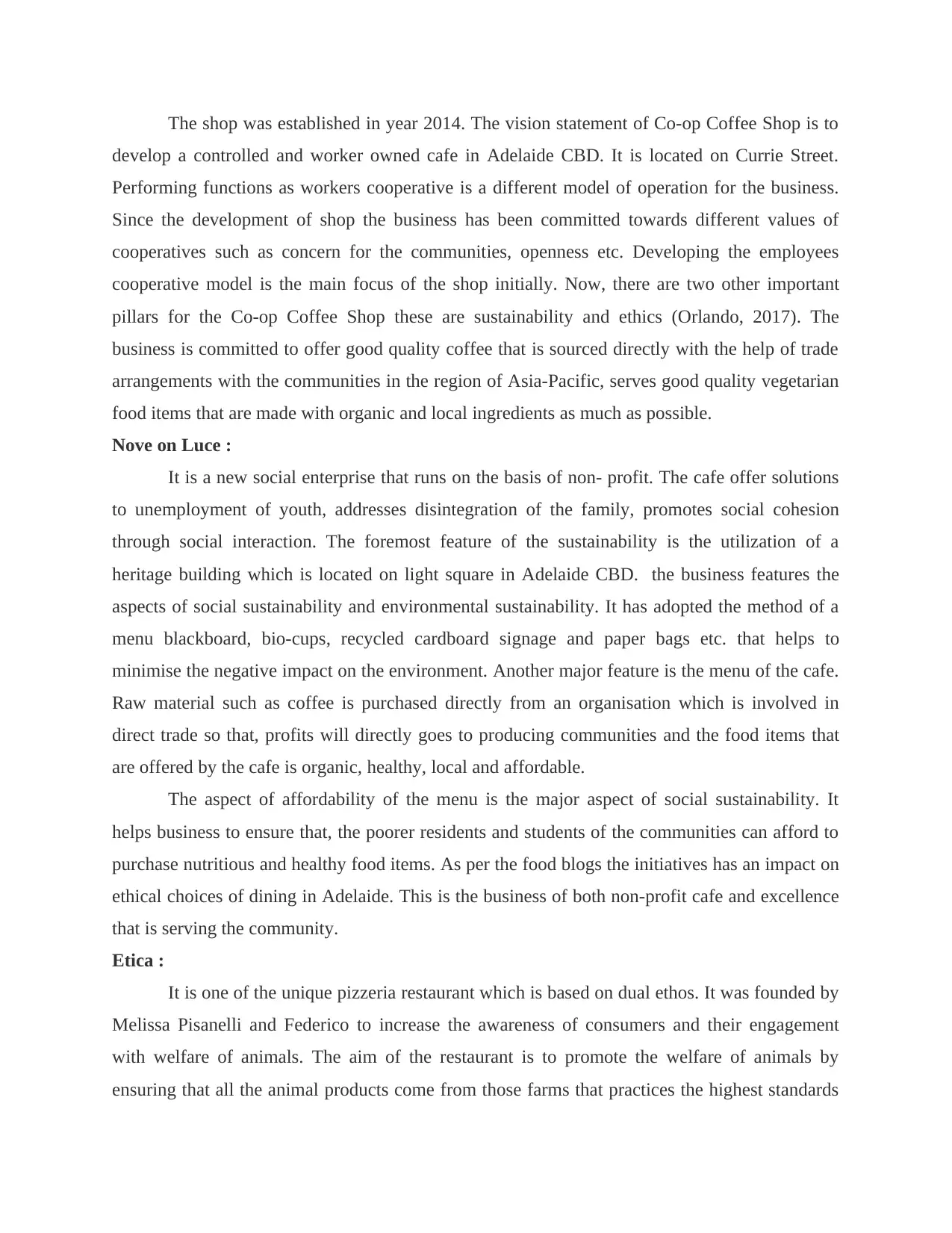
The shop was established in year 2014. The vision statement of Co-op Coffee Shop is to
develop a controlled and worker owned cafe in Adelaide CBD. It is located on Currie Street.
Performing functions as workers cooperative is a different model of operation for the business.
Since the development of shop the business has been committed towards different values of
cooperatives such as concern for the communities, openness etc. Developing the employees
cooperative model is the main focus of the shop initially. Now, there are two other important
pillars for the Co-op Coffee Shop these are sustainability and ethics (Orlando, 2017). The
business is committed to offer good quality coffee that is sourced directly with the help of trade
arrangements with the communities in the region of Asia-Pacific, serves good quality vegetarian
food items that are made with organic and local ingredients as much as possible.
Nove on Luce :
It is a new social enterprise that runs on the basis of non- profit. The cafe offer solutions
to unemployment of youth, addresses disintegration of the family, promotes social cohesion
through social interaction. The foremost feature of the sustainability is the utilization of a
heritage building which is located on light square in Adelaide CBD. the business features the
aspects of social sustainability and environmental sustainability. It has adopted the method of a
menu blackboard, bio-cups, recycled cardboard signage and paper bags etc. that helps to
minimise the negative impact on the environment. Another major feature is the menu of the cafe.
Raw material such as coffee is purchased directly from an organisation which is involved in
direct trade so that, profits will directly goes to producing communities and the food items that
are offered by the cafe is organic, healthy, local and affordable.
The aspect of affordability of the menu is the major aspect of social sustainability. It
helps business to ensure that, the poorer residents and students of the communities can afford to
purchase nutritious and healthy food items. As per the food blogs the initiatives has an impact on
ethical choices of dining in Adelaide. This is the business of both non-profit cafe and excellence
that is serving the community.
Etica :
It is one of the unique pizzeria restaurant which is based on dual ethos. It was founded by
Melissa Pisanelli and Federico to increase the awareness of consumers and their engagement
with welfare of animals. The aim of the restaurant is to promote the welfare of animals by
ensuring that all the animal products come from those farms that practices the highest standards
develop a controlled and worker owned cafe in Adelaide CBD. It is located on Currie Street.
Performing functions as workers cooperative is a different model of operation for the business.
Since the development of shop the business has been committed towards different values of
cooperatives such as concern for the communities, openness etc. Developing the employees
cooperative model is the main focus of the shop initially. Now, there are two other important
pillars for the Co-op Coffee Shop these are sustainability and ethics (Orlando, 2017). The
business is committed to offer good quality coffee that is sourced directly with the help of trade
arrangements with the communities in the region of Asia-Pacific, serves good quality vegetarian
food items that are made with organic and local ingredients as much as possible.
Nove on Luce :
It is a new social enterprise that runs on the basis of non- profit. The cafe offer solutions
to unemployment of youth, addresses disintegration of the family, promotes social cohesion
through social interaction. The foremost feature of the sustainability is the utilization of a
heritage building which is located on light square in Adelaide CBD. the business features the
aspects of social sustainability and environmental sustainability. It has adopted the method of a
menu blackboard, bio-cups, recycled cardboard signage and paper bags etc. that helps to
minimise the negative impact on the environment. Another major feature is the menu of the cafe.
Raw material such as coffee is purchased directly from an organisation which is involved in
direct trade so that, profits will directly goes to producing communities and the food items that
are offered by the cafe is organic, healthy, local and affordable.
The aspect of affordability of the menu is the major aspect of social sustainability. It
helps business to ensure that, the poorer residents and students of the communities can afford to
purchase nutritious and healthy food items. As per the food blogs the initiatives has an impact on
ethical choices of dining in Adelaide. This is the business of both non-profit cafe and excellence
that is serving the community.
Etica :
It is one of the unique pizzeria restaurant which is based on dual ethos. It was founded by
Melissa Pisanelli and Federico to increase the awareness of consumers and their engagement
with welfare of animals. The aim of the restaurant is to promote the welfare of animals by
ensuring that all the animal products come from those farms that practices the highest standards
⊘ This is a preview!⊘
Do you want full access?
Subscribe today to unlock all pages.

Trusted by 1+ million students worldwide
1 out of 15
Related Documents
Your All-in-One AI-Powered Toolkit for Academic Success.
+13062052269
info@desklib.com
Available 24*7 on WhatsApp / Email
![[object Object]](/_next/static/media/star-bottom.7253800d.svg)
Unlock your academic potential
Copyright © 2020–2025 A2Z Services. All Rights Reserved. Developed and managed by ZUCOL.




